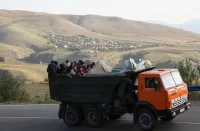President Erdogan declared that the Baku-Tbilisi-Kars railway is “an important chain in the New Silk Road, which aims to connect Asia, Africa, and Europe” while speaking in the Azerbaijani capital during at the opening ceremony for this transnational connectivity corridor.

The event was also attended by the Prime Ministers of Georgia, Kazakhstan, and Uzbekistan, as well as ministers from Tajikistan and Turkmenistan, demonstrating its broad geographic appeal. Erdogan most immediately hopes that it will enhance comprehensive relations between Turkey and its fellow ethno-Turkish compatriots in Central Asia, and that afterwards the BTK railway could be utilized by Europeans and North Africans in connecting to this landlocked region as well. Ultimately, the goal is to turn this South-Central Corridor into a well-traversed New Silk Road linking the Western and Eastern corners of Eurasia together by connecting the EU with China, and while a quick look at the physical map would suggest that this multimodal route is somewhat unwieldly, the political one says otherwise.
The most direct routes connecting the EU with China are the planned Eurasian Land Bridge across Russia and the Northern Sea Route through the Arctic Ocean, but both are comparatively underdeveloped at the moment for various reasons. In addition, while there are plans to construct a high-speed railway across Central Asia in connecting China with Iran, and thenceforth to Turkey and the EU, this idea has yet to get past the drawing board and could in any case be endangered by the regular risk of Kurdish terrorist activity in these two Great Powers’ shared Mideast borderlands. Another key point is that the US-provoked New Cold War has created artificial geopolitical obstacles to Eurasian integration as Washington seeks to “isolate” Moscow and Tehran, so there’s a chance that China’s planned corridors across its multipolar partners’ territories might not materialize as quickly as expected.
All of these factors surprisingly make the BTK railway the most presently efficient route for the EU, Turkey, and North Africa to access Central Asia, and eventually even China as well once the proper connectivity infrastructure is built in the region to facilitate this. Looking forward, while it’s doubtful that this route will ever become the primary corridor for EU-Chinese trade, it’ll probably be much more successful in strengthening Turkey’s influence in the former Soviet Republics of Central Asia, something that many Turkish strategists had spoken about and hoped for since 1991 but barely made any progress on. This could contribute to diversifying the regional governments’ foreign partnerships and, in the true sense of the word, making them more multipolar.
By establishing a more robust presence in Central Asia, which is historically in Russia’s sphere of influence, Turkey would also be expanding the complex strategic interdependency that’s developed between Moscow and Ankara since their fast-moving rapprochement kicked off last summer. This would in turn tighten their bilateral partnership and diminish the chances that the US would ever again be successful in turning them against one another due to the heightened collateral damage that this would entail to both of their interests as a result of the long-term geopolitical changes introduced by the BTK railway.
The post presented is the partial transcript of the CONTEXT COUNTDOWN radio program on Sputnik News, aired on Friday Nov 3, 2017:
DISCLAIMER: The author writes for this publication in a private capacity which is unrepresentative of anyone or any organization except for his own personal views. Nothing written by the author should ever be conflated with the editorial views or official positions of any other media outlet or institution.














Pingback: The Baku Tblisi Kars (KTK) Railway Is Turkey’s Silk Road Corridor To Central Asia – Counter Information
Pingback: The Geopolitics of the Lapis Lazuli Corridor – Afghanistan Diplomacy
Pingback: Vers où va-t-on ?:La Pologne et la Suède construisent un anneau baltique-la Pologne s’est toujours trompée de guerre et la Suède est le néant incarné | actualitserlande
Pingback: Iran’s Responsible For The Caspian Summit’s Success | OrientalReview.org
Pingback: Iran’s Responsible For The Caspian Summit’s Success – ICEPI NEWS
Pingback: Iran’s Responsible For The Caspian Summit’s Success – WEBSTYNX
Pingback: ولې د لاجوردو لاره افغانستان او غړو هېوادونو ته ارزښت لري؟ – CSRS | مرکز مطالعات استراتیژيک و منطقوی | د ستراتېژیکو او سیمه ییزو څېړنو مرکز
Pingback: The US Is Preparing Another Color Revolution In Georgia For Next Year | Verity Weekly
Pingback: The US Is Preparing Another Color Revolution In Georgia For Next Year – American Patriots
Pingback: Les États-Unis préparent une autre Révolution de Couleur en Géorgie pour l’année prochaine – DE LA GRANDE VADROUILLE A LA LONGUE MARGE
Pingback: Georgia: Is the US Preparing Another Color Revolution? - Mideast Discourse
Pingback: Georgia: Is the US Preparing Another Color Revolution? – Counter Information
Pingback: لاجورد دهلیز د سیمه اییز او نړیوال جیوپولیټيک په رڼا کې – Pajhwok Afghan News
Pingback: Turkey’s Growing Influence in Central Asia – The Diplomat – BalkansTimes
Pingback: Turkey’s Growing Influence in Central Asia – The Diplomat - News Tetra
Pingback: Turkey’s Growing Influence in Central Asia – The Diplomat - Global Story Zone
Pingback: Turkey’s Growing Influence in Central Asia read more at worldnews365.me - World News 365
Pingback: Turkey’s Growing Influence in Central Asia – The Diplomat | Dirty Politico
Pingback: Turkey’s Growing Influence in Central Asia – The Diplomat | Taiwan News – News Live 24×7